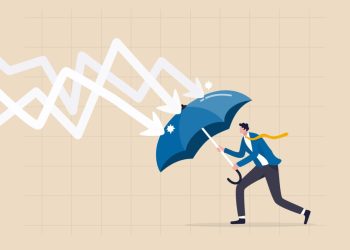 RISMedia, May 31 2011— When the financial crisis swept the nation, it left a trail of destruction from sea to shining sea. One reason it caused so much devastation is because at the time many Americans were living paycheck to paycheck, financing purchases they couldn’t afford.
RISMedia, May 31 2011— When the financial crisis swept the nation, it left a trail of destruction from sea to shining sea. One reason it caused so much devastation is because at the time many Americans were living paycheck to paycheck, financing purchases they couldn’t afford.
And while many Americans have finally gotten wise to the importance of saving a buck—today, the personal savings rate is in the 5 percent range—Eric Tyson wishes it hadn’t taken a crisis to make the message sink in. And he’s adamant that younger Americans learn from the free-spending, debt-accumulating mistakes of folks of all ages. And there’s no better time to master a frugal mind-set than when you start to spread your adult wings right out of college.
“For most young people, the first time they taste complete financial independence is when they graduate college,” says Tyson, author of Personal Finance in Your 20s For Dummies®. “And it’s not unusual to go a little crazy and start buying—or financing, as the case may be—what you want.
“Realizing that you and only you are in charge of paying your bills, covering other expenses, and making sure you have enough left over to save can be overwhelming,” he admits.
Personal Finance in Your 20s for Dummies provides young adults the targeted financial advice they need to establish a firm financial footing as they start out in the “real” world. The book covers topics from how to invest wisely to how to improve your credit score to how to change your spending habits if you end up unemployed. Reading it is an important first step to building a strong financial foundation.
“The key to a healthy financial future is learning how to save,” says Tyson. “When you’re right out of college and getting settled into your first job, saving money can be a challenge, of course. Although you’re likely not earning a super-high income, you can live life and still buy the items you need.”
How and where you spend your money is a matter of personal choice and priorities, but those choices can affect the amount of money you have to save.
Here are a few tips from Tyson on how to save more and spend less:
Rent smart. When you’re in your early 20s and you don’t have dependents, living in a low-cost fashion is easier than it is later in life. There are many ways to minimize costs if you are renting your living space. Two great ways to keep costs down are living with relatives or having roommates. But no matter who you are living with (and certainly if you are living alone), you should minimize your monthly rent. If you find that you’ve allowed your champagne tastes to exceed your beer budget, so long as you’re completing your current lease, there’s no reason you can’t move to a lower-cost rental. Just be sure to factor in all the costs of moving to and living in a new rental.
“When it is time to re-up on your lease, don’t be afraid to negotiate,” says Tyson. “Some landlords increase their tenants’ rent no matter how good the tenant has been and regardless of the state of the economy. That said, a smart landlord doesn’t want to lose good tenants who pay rent on time. State your case through a well-crafted and polite note or personal visit. Explain how you have been a responsible tenant, always paid your rent on time, and cared for your unit, and if it’s the case, convey that your research shows comparable rentals going for less. Even if you can’t stave off the rent increase, you might be able to negotiate some improvements you value.”
Cut your taxes. Alongside the costs of owning or renting a home, taxes are the other large personal expenditure for most folks. Everyone gets socked with taxes when earning income and when investing and spending money. That’s the bad news—the good news is that you can reduce the amount of taxes you pay by using some relatively simple yet powerful strategies.
“One strategy is to utilize a retirement savings plan,” explains Tyson. “To take advantage of such plans, you must spend less than you earn. Only then can you afford to contribute to these plans. Another great strategy is to reduce the amount of sales tax you pay. To do so, you must spend less and save more. When you buy most consumer products, you pay sales tax. Therefore, if you spend less money and save more in retirement accounts, you reduce your income and sales taxes.”
Cook up lower food costs. Not eating is one way to reduce food expenditures, but you might not find that solution all that appetizing! Thankfully, there are many other ways to keep your food costs low. One is to avoid eating at restaurants and instead learn to cook for yourself. Making your own food is often healthier (if you make the right meals!), and because you put in all that hard work, you end up enjoying the food more. When you go to buy the groceries you’re going to cook up, avoid name-brand products and instead go for store brands. They are usually the same quality (and sometimes the same product) as the name brand at a lower price.
“Now, I realize that when you’re in your early 20s, out of college and with a new job, you finally have a little spending money, and using it to dine out with friends can be a lot of fun,” says Tyson. “With that in mind, you don’t have to completely cut it out of your life; just make smart decisions to avoid extra costs. For example, eating out for breakfast or lunch is usually cheaper than going out for dinner. Drink water to avoid beverage costs. Remember, alcohol is especially expensive when dining out. And make smart menu choices. For example, vegetarian dishes cost less than premium meat-based entrees and are generally healthier for you.”
Get up and go for less. Getting to and fro on a daily basis can get expensive if you don’t keep an eye on your expenses. Many people rely on cars for their transportation. Cars can be a tremendous financial burden, especially if you borrow to buy or lease the car. When possible, opting for public transportation is a great way to save money. And in some cities, it allows you to avoid having a car altogether. Another great option is to opt for two wheels instead of four. Riding your bike has the double benefit of saving you money and being great exercise.
“If you must have a car, look at cheaper options than financing or leasing one,” says Tyson. “Spending on cars is one of the leading causes of overspending and undersaving. The main reason people end up spending more than they can afford on a car is that they finance the purchase. When buying a car, you should buy one you can afford with cash, which for many people means buying a good-quality used car.
“Don’t make the mistake of simply comparing sticker prices,” he adds. “Consider the total long-term costs of car ownership, which include gas, insurance, registration fees, maintenance, repairs, and taxes. And be sure to consider the safety of any car you buy, as driving is surely the most dangerous thing you do.”
Finesse your fashion finances. When you’re starting your first “real” job, it’s only natural to want to look your best. But looking your best doesn’t have to require that you wear only the latest fashions. In fact, you really don’t need to buy lots of new clothes every year. True fashion, as defined by what people are actually wearing day to day, changes quite slowly. In fact, the classics never go out of style. If you want the effect of a new wardrobe every year, store last year’s purchases away next year and then bring them out the year after. Or rotate your clothing inventory every third year.
“You might also want to consider avoiding buying wools and silks that require costly dry cleaning,” notes Tyson. “Or, rather than shop at the mall or fashion boutiques, buy gently used clothing at consignment shops, vintage shops, or online. When you do go to the mall, go when the stores are having huge sales with major price reductions. And minimize the amount you spend on accessories. Shoes, jewelry, handbags, and the like can gobble up large amounts of money.”
Budget your fun funds. Having fun and taking time out for recreation can be money well spent. However, if you engage in financial extravagance in the name of fun, you can quickly wreck an otherwise good budget. Spending more money shouldn’t be equated with having more fun. Many movies, theaters, museums, and restaurants offer discount prices on certain days and times. And other recreational options, such as visiting with friends, hiking, reading, and playing sports, can be good for your finances as well as your mental and physical health.
“And don’t worry, being a smart saver and spender doesn’t mean you’ll never get to go on a fun vacation,” says Tyson. “Just be sure that you can afford the vacations you take. Don’t borrow on credit cards to finance your travels. Try taking shorter vacations that are closer to home. For example, have you been to a state or national park recently? Or take a vacation at home, visiting the sites in your local area. For longer distance travel, go during the off-season and off-peak times and research the days for the best deals on airfares and hotels.”
Tame your technology spending. These days it seems like there is a never-ending stream of new gadgets. Unfortunately, though, the cost of these gadgets adds up. Err on the side of keeping your life simple. Doing so costs less, reduces stress, and allows more time for the things that really do matter in life.
“Remember, there’s no prize for being the first person to get something new,” notes Tyson. “When new gadgets first hit the market, prices are high and the gadget inevitably has bugs. Wait a couple of years and your patience will be rewarded with much lower prices and more reliable products.
“Cell phones are a particular gadget that can encourage wasting money,” he adds. “In addition to downloads, text messaging, Web surfing, and other services, you can find all sorts of entertaining ways to run up huge cell phone bills each month. Ask yourself whether you really need all these costly bells and whistles. If you don’t use your phone a lot, consider a prepaid plan where you pay only for what you use. If you typically use a few hundred minutes per month or fewer, you should save money with one of these plans.”
Keep down insurance costs. Insurance is a major and costly part of our lives. There’s health insurance, car insurance, homeowner’s insurance, renter’s insurance, and more, and they all add up.
“To keep your insurance costs down, consider utilizing high deductibles,” advises Tyson. “Each insurance policy has a deductible, which is the amount of a loss that must come out of your pocket before coverage kicks in. Higher deductibles can help to greatly lower your premiums. Also, remember to always shop around. Rates vary tremendously among insurers, so do some research before choosing your plans. Finally, simply taking care of your health can help you save big time on insurance. Exercise at least a few times a week and eat healthfully. You get only one body and one chance to take care of it.”
Seek out professional advice when needed. Although your life may be relatively simple now, sometimes you may have to deal with new challenges, and you may benefit from having a seasoned pro at your side. Tax, legal, business, and financial advisors can be worth more than their expense if they know what they’re doing and you pay a reasonable fee.
“The caveat to this advice is professionals should be used only as needed,” says Tyson. “And always be wary of professionals who create or perpetuate work and have conflicts of interest with their recommendations. When you do hire a professional, scrutinize and interview them thoroughly. Do background research to evaluate each prospective advisor’s strengths and biases. Be sure to check references and conduct an Internet search to see what you can find out about the person. Check regulatory associations in your state for any citations or actions taken against them.”
Be smart about healthcare expenses. When you’re young and in good health, you usually don’t give much thought to healthcare expenses and health insurance. But you have health insurance for a reason, and unfortunately, the cost of healthcare continues to rise faster than overall inflation.
“Keep in mind that there are many different plan designs with a wide variation in costs,” notes Tyson. “Do your research. The same should be said for medical care. Some healthcare facilities might factor in the cost of a fancy office space or state-of-the-art technology into their costs. Look for the facilities in your area that provide quality care at a reasonable price. And be sure to carefully examine your employer’s benefit plan.
“When you are weighing your healthcare options, take advantage of being able to put away a portion of your income before taxes to pay for out-of-pocket healthcare expenses, especially in health savings accounts,” he adds.
Slice homeowner expenses. If you’re just graduating college, buying a home might not be on your radar yet. But because it will be one of the biggest investments you make in your life, it’s never too soon to start thinking about it. You can take many steps to keep your home ownership costs down and under control without neglecting your property or living like a pauper. The first step is to buy a home that fits your budget. During the real estate boom of the early- to mid-2000s, many people bought houses they couldn’t truly afford. When the market crashed, some of those people with severely stretched budgets lost their homes to foreclosure because they got in over their heads, fell on hard times, and couldn’t afford their monthly mortgage payments.
“Remember, even if you can afford the monthly mortgage payment on a house you’re looking to buy, if you have too little money left over for your other needs and wants—such as taking trips, eating out, going to concerts, enjoying hobbies, or saving for retirement—your dream home may become a financial prison,” notes Tyson. “Once you do buy, consider ways to cut your monthly mortgage payment such as getting a responsible roommate and containing your utility costs.”
“At your first job out of college, your salary will probably be somewhat low,” says Tyson. “And after fixed expenses, such as your rent or mortgage, food, insurance, and so on, you may not have much money left for ‘fun’ discretionary spending, let alone additional savings.
“Remember, though, when it comes to building wealth, it doesn’t matter what you make; it’s what you spend, and, therefore, are able to save, that counts. Many wealthy people didn’t get rich based exclusively on their big salaries, but through disciplined saving and wise investing over time. Learn to save more and spend less now, and you will be able to lead a less financially stressed life.”










